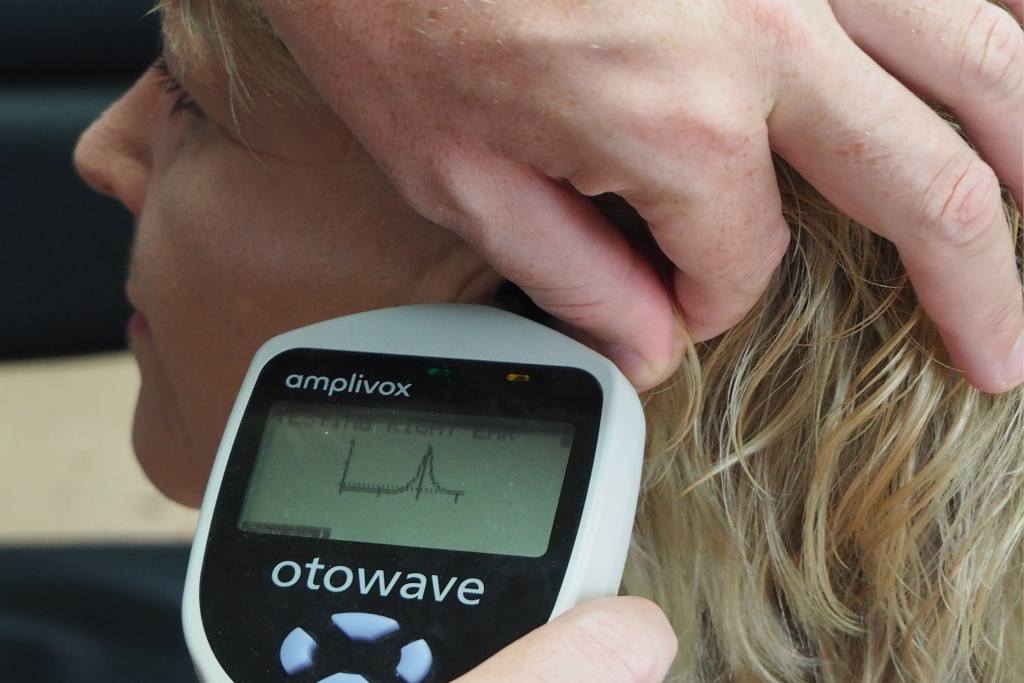
Keeping Our Ear Canals Healthy

Many of us know the feeling of scratching an ear itch and feeling wax in our ears, or taking out an earbud to see wax on the tip. Where does this wax come from, and what should we do about it?
What is ear wax?
Ear wax is a common product made in the ear canal that consists of keratin and cerumen (oily secretions created by glands within the ear canal. How much wax, wax consistency, and wax colour can vary from person to person.
Why do we have ear wax?
There are various theories as to why we produce ear wax. The most common theory is that wax serves to both protect and clean our ears. The wax in our ears provides a protective layer to the sensitive skin in out ear canal. Wax acts as a lubricant for the ear canal which can reduce dryness or itchiness. It is not uncommon to see people mention itchy ears when they use Q-tips as they are removing the natural lubricant of their ears. As an added bonus, wax helps the ear by cleaning it; Wax moves the dead skin towards the entrance of the ear canal, taking any dust or debris with it.
Why do we get a build-up of ear wax?
The reason we get a build-up of earwax or impacted earwax can vary from person to person. Commonly we see that individuals with “hard wax” are more likely to be impacted due to the wax not moving as quickly towards the ear canal. Some individuals have small, or curvy, ear canals which can result in the wax being “trapped behind corners”, which can be difficult for someone to remove on their own.
Side effects of too much ear wax
Overall, keeping the ear canal health and dry is a crucial part to managing the condition of your ears. Clean ears help prevent problems that sometimes occur when the ear canals become too wet or plugged up with earwax.
How to Take care of your ears.
- Avoid the use of Q-Tips – using Q-Tips can cause wax to be pushed further in the ear resulting in compacted wax that can be difficult to remove. You also risk harming delicate middle ear structures if Q-tips are not used properly. Instead to clean the ear we recommend using a soft towel to wipe down the outside of the ear after a shower.
- Consult your family physician or audiologist before using any wax softening/removal remedies. You want to be sure before you try to remove the wax that there are no other concerns with the ear such as irritation or infection. It may be the case that your earwax has hardened in the ear resulting in it being difficulty to remove. Your overseeing clinician may recommend softening the earwax before removing. Always consult before placing something in your ears.
- Dry outer ear: if your find that your outer ear has become dry, try using a drop of mineral oil to sooth the skin of the ear.
Wax Removal Strategies that clinicians may use:
- Curette – A curette is small plastic scoop used by audiologists to gently scoop out wax in the canal.
- Flushing – Flushing with water can be done at home by the client or in clinic by a trained audiologist or doctor. If done at home, there is the risk of pushing wax deeper into the canal against the eardrum which can cause discomfort. The benefits of having a trained professional flush your ear includes ensuring correct water temperature, correct pressure, and maintaining the health of the eardrum.
- Suction –Only done by trained audiologists or Ear, Nose, and Throat (ENT) specialists. Suction can be an effective way to remove earwax when traditional methods like curettes and flushing cannot be done.
If you think you have impacted or bothersome wax in your ears, please reach out to see what your options are for wax removal.
No content on this blog should ever be used as a substitute for direct medical advice from your doctor or other qualified clinician.

Understanding Auditory Processing Assessment: A Key to Unraveling Learning Challenges

In learning and cognitive development, auditory processing plays a pivotal role. Our auditory processing abilities affect how our brain recognizes and perceives sounds and how we make sense of the auditory information in our environment. However, for some, this process might not occur as seamlessly, leading to learning challenges that often remain misunderstood.
The Importance of Assessing Auditory Processing Concerns:
Assessing auditory processing is crucial in identifying and understanding potential learning challenges. Many learning difficulties can be linked to an underlying issue in auditory processing. For instance, a child may struggle with reading due to difficulty discriminating between similar sounds (like ‘b’ and ‘d’) or might face difficulties following verbal instructions in a noisy classroom environment.
Understanding these challenges through assessment is the first step in tailoring effective interventions and accommodations. Educators, parents, and professionals can create specialized strategies to support individuals with auditory processing difficulties, promoting better learning outcomes.
What is an Auditory Processing Assessment?
Auditory Processing assessments are a comprehensive evaluation aimed at understanding how an individual processes auditory information. It involves a series of tests that evaluate various auditory skills, such as:
1. Auditory discrimination: The ability to distinguish between different sounds.
2. Auditory temporal processing and patterning: The capacity to understand and remember the order of sounds or words.
3. Auditory separation and integration: The ability to distinguish between sounds when sounds are presented to each ear simultaneously
4. Auditory monaural low redundancy: The ability to fill in missing components of distorted speech.
5. Auditory binaural interaction: The capacity to synthesize incomplete information from each ear into a comprehensive message.
Who Benefits from Auditory Processing Assessment?
1. Children in Education: Identifying auditory processing issues can guide educators in providing targeted support, such as preferential seating, the use of assistive listening devices, or modified teaching methods.
2. Adults in the Workplace: Understanding one’s auditory processing abilities can help optimize work environments, improving communication and productivity.
3. Individuals with Learning Challenges: For those with diagnosed learning disabilities, an auditory processing assessment can uncover underlying factors contributing to their difficulties, leading to more precise and effective interventions.
Conclusion
In the realm of learning and cognition, auditory processing assessments are a crucial tool in understanding how individuals perceive and process auditory information. By identifying and understanding auditory processing challenges, we pave the way for more targeted and effective support, ultimately improving learning experiences and outcomes for individuals across various stages of life.
At Wild Rose Audiology, we focus primarily on pediatric AP testing. However, we are always looking for new ways to serve our community and are considering expanding our age range in the future. Keep checking in for more updates on our available audiological assessments.
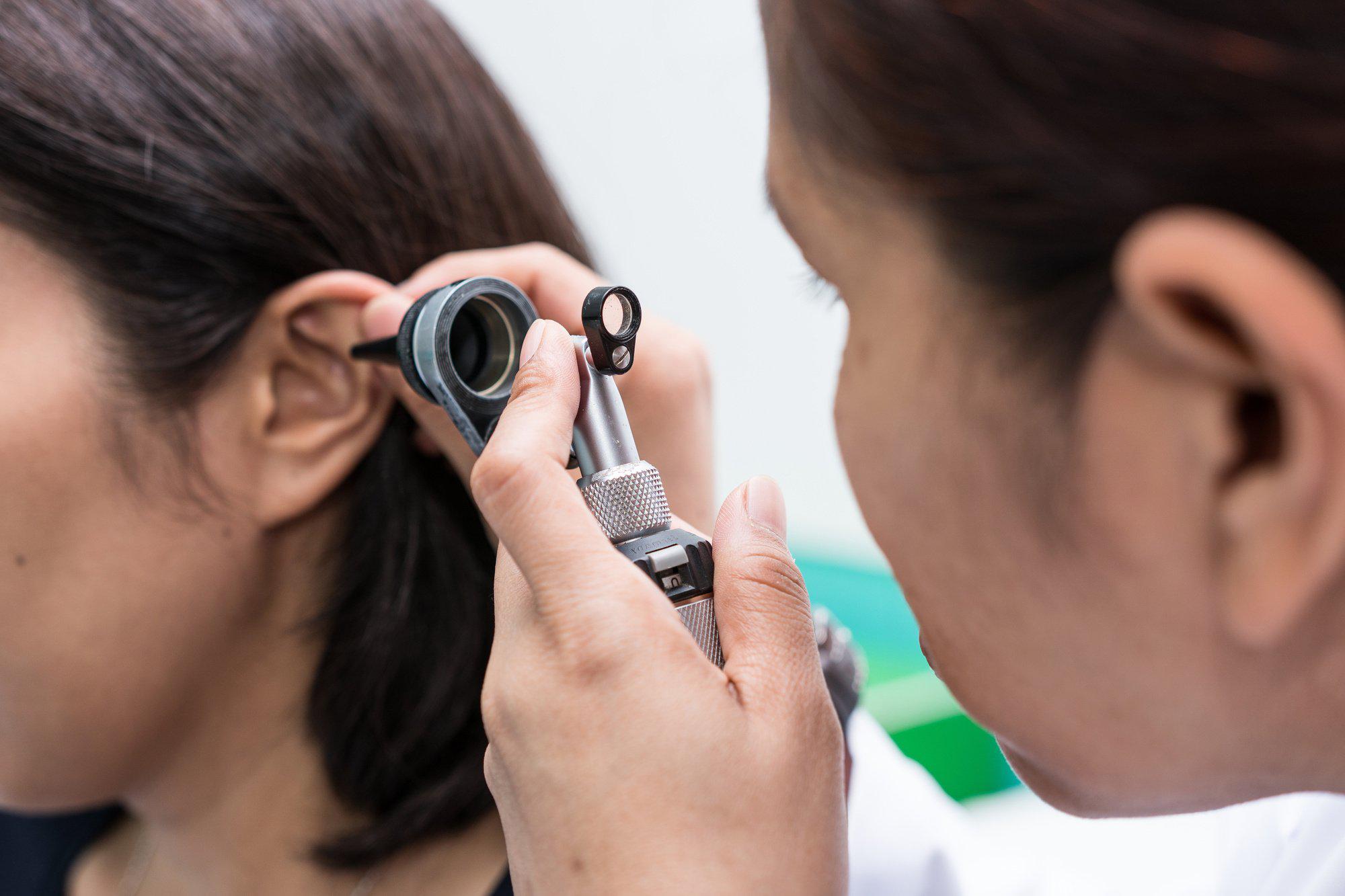
Unveilling Surprising Causes of Hearing Loss
Have you ever paused during a conversation only to realize you missed half of what was said? Having trouble hearing is more common than people think.
Hearing loss is commonly linked to aging or prolonged exposure to loud noises. But did you know other surprising factors that could be affecting your hearing?
This blog aims to uncover lesser-known causes of hearing loss and how our audiologists at Wild Rose Audiology Clinic in Edmonton can assist you in your journey towards better hearing.
Medications and Hearing Loss
Many individuals are unaware of the potential side effects some medications can have on their auditory health. Both over-the-counter and prescription drugs can pose risks.
For instance, specific antibiotics known as aminoglycosides have been linked to hearing problems when used for extended periods or in high doses.
Diuretics, commonly used to treat blood pressure and heart conditions, can sometimes cause temporary hearing loss or tinnitus.
Taking large doses of aspirin over a short time has been connected to temporary ringing in the ears or hearing loss. Given the potential auditory side effects of these and other medications, it is imperative to monitor your hearing.
Injuries and Trauma
Our ears are delicate structures, vulnerable to a range of physical traumas. While many people recognize the dangers of prolonged exposure to loud noises, fewer are aware of how injuries can impact their hearing.
Direct blows to the head, for example, can lead to inner ear damage. This injury may cause temporary or permanent hearing loss.
Rapid changes in air pressure experienced during events like scuba diving or fast ascents and descents in airplanes can stress the eardrum and lead to barotrauma. This painful condition can cause hearing complications.
Health Conditions
Meniere’s disease, characterized by fluid build-up in the inner ear, can cause episodes
of vertigo, tinnitus, and even hearing loss.
Diabetes: Individuals with diabetes tend to have a higher risk of experiencing hearing
impairment compared to those without the condition. The exact mechanisms behind this
correlation are still being investigated, but it’s believed that high blood sugar levels over
time can cause damage to the small blood vessels in the inner ear, affecting the hearing
function. Proper management of diabetes is crucial not only for overall health but also to
potentially reduce the risk of developing hearing loss.
High blood pressure can have auditory implications, as it can strain the vascular system and impact the health of the inner ear.
Virus Infections: Certain viral infections have been associated with sudden
sensorineural hearing loss (SSNHL). Viruses like those responsible for mumps,
measles, influenza, and specific herpes strains, including herpes simplex, can lead to a
sudden, unexplained decrease in hearing ability.
Lifestyle Factors
Smoking, apart from its well-documented health implications, has also been
associated with an increased risk of hearing loss. The toxic components in cigarettes
not only harm overall health but can also damage the delicate inner ear hair cells,
leading to hearing impairment.
The absence of essential nutrients in one’s diet, such as folate and omega-3
fatty acids, may contribute to hearing loss. These nutrients play a vital role in
maintaining the health of the auditory system, and their deficiency could impact hearing
abilities.
Occupational Risks
Certain chemicals in occupational settings, like solvents or heavy metals, have been
linked to hearing impairment. Prolonged exposure to these
substances can lead to damage in the auditory system, affecting hearing abilities.
Genetic and Other Factors
Genetic Predisposition: Some individuals may be genetically inclined to experience
hearing difficulties. While external factors play a role, genetic predispositions might
make certain people more vulnerable to hearing loss.
Stress and Mental Health: Studies have suggested a potential link between high-stress
levels, anxiety, and depression with an increased risk of hearing loss. The exact
mechanisms underlying this connection are still under investigation.
Take Control of Your Hearing With Wild Rose Audiology Clinic
Hearing loss is influenced by a spectrum of factors extending beyond age and noise
exposure. Understanding these diverse causes – whether health-related, lifestyle
habits, occupational hazards, or genetic predispositions – is pivotal. By recognizing
these contributing factors and taking proactive measures, individuals can significantly
impact and preserve their hearing health.
Wild Rose Audiology Clinic in Edmonton is committed to offering top-tier audiological services, from a complete hearing evaluation to hearing aid evaluations and fittings.
If you’re having trouble hearing, please Book an appointment with one of or audiologists.
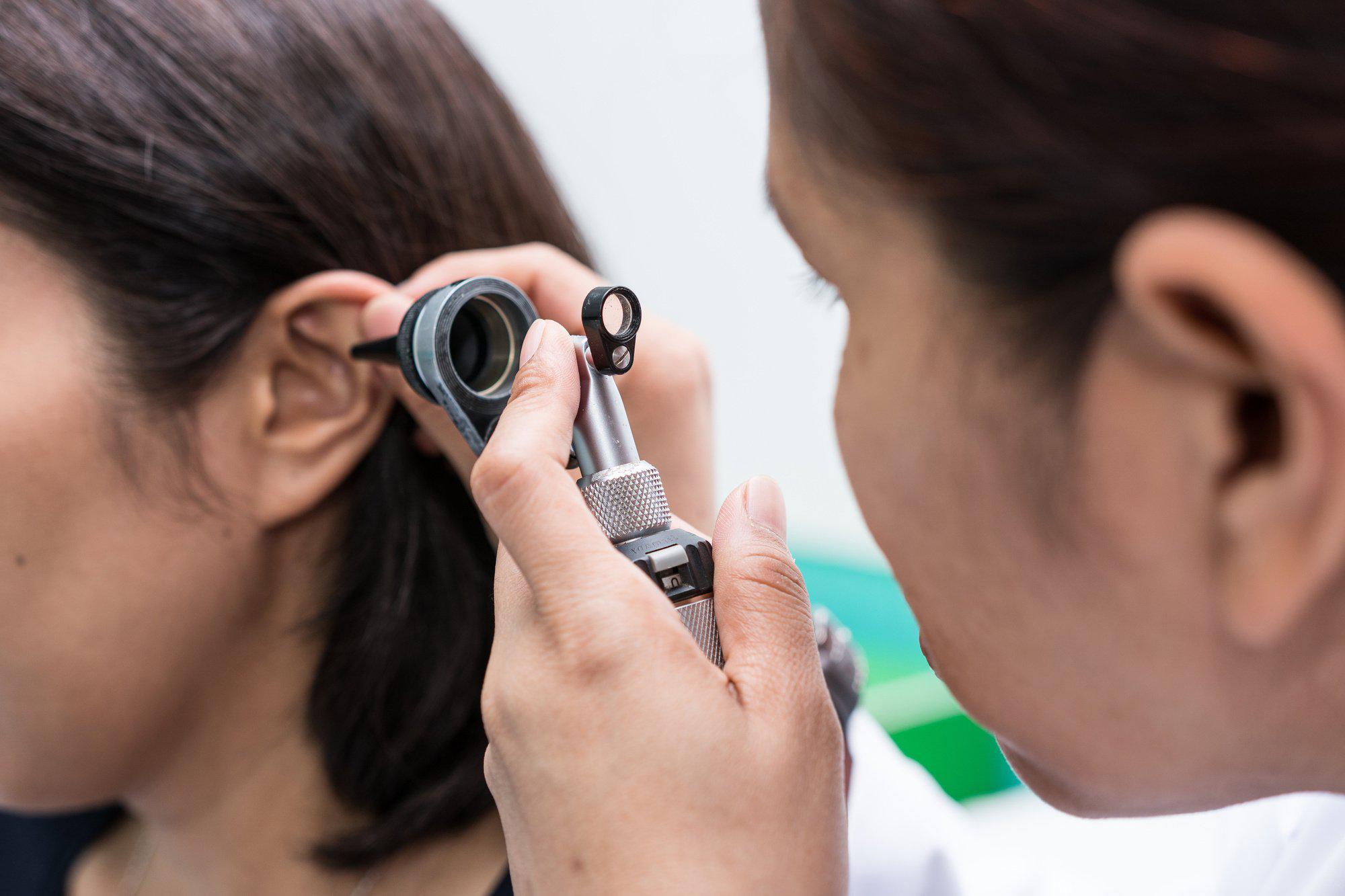
Unveilling Surprising Causes of Hearing Loss
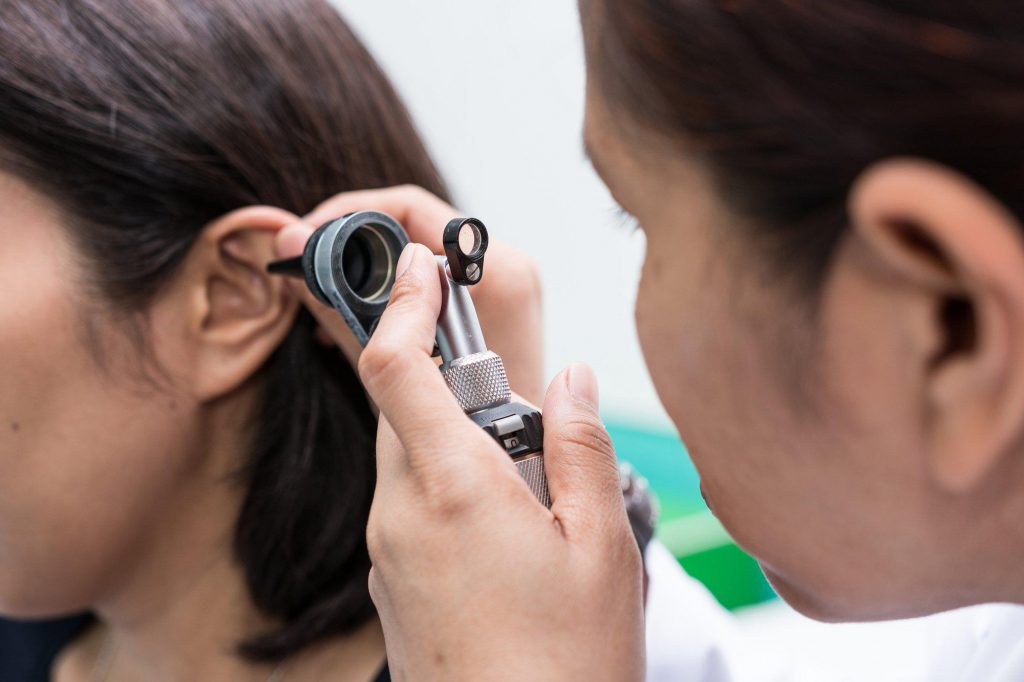
Have you ever paused during a conversation only to realize you missed half of what was said? Having trouble hearing is more common than people think.
Hearing loss is commonly linked to aging or prolonged exposure to loud noises. But did you know other surprising factors that could be affecting your hearing?
This blog aims to uncover lesser-known causes of hearing loss and how our audiologists at Wild Rose Audiology Clinic in Edmonton can assist you in your journey towards better hearing.
Medications and Hearing Loss
Many individuals are unaware of the potential side effects some medications can have on their auditory health. Both over-the-counter and prescription drugs can pose risks.
For instance, specific antibiotics known as aminoglycosides have been linked to hearing problems when used for extended periods or in high doses.
Diuretics, commonly used to treat blood pressure and heart conditions, can sometimes cause temporary hearing loss or tinnitus.
Taking large doses of aspirin over a short time has been connected to temporary ringing in the ears or hearing loss. Given the potential auditory side effects of these and other medications, it is imperative to monitor your hearing.
Injuries and Trauma
Our ears are delicate structures, vulnerable to a range of physical traumas. While many people recognize the dangers of prolonged exposure to loud noises, fewer are aware of how injuries can impact their hearing.
Direct blows to the head, for example, can lead to inner ear damage. This injury may cause temporary or permanent hearing loss.
Rapid changes in air pressure experienced during events like scuba diving or fast ascents and descents in airplanes can stress the eardrum and lead to barotrauma. This painful condition can cause hearing complications.
Health Conditions
Meniere’s disease, characterized by fluid build-up in the inner ear, can cause episodes of vertigo, tinnitus, and even hearing loss.
Diabetes: Individuals with diabetes tend to have a higher risk of experiencing hearing impairment compared to those without the condition. The exact mechanisms behind this correlation are still being investigated, but it’s believed that high blood sugar levels over time can cause damage to the small blood vessels in the inner ear, affecting the hearing function. Proper management of diabetes is crucial not only for overall health but also to potentially reduce the risk of developing hearing loss.
High blood pressure can have auditory implications, as it can strain the vascular system and impact the health of the inner ear.
Virus Infections: Certain viral infections have been associated with sudden sensorineural hearing loss (SSNHL). Viruses like those responsible for mumps, measles, influenza, and specific herpes strains, including herpes simplex, can lead to a sudden, unexplained decrease in hearing ability.
Lifestyle Factors
Smoking, apart from its well-documented health implications, has also been
associated with an increased risk of hearing loss. The toxic components in cigarettes not only harm overall health but can also damage the delicate inner ear hair cells, leading to hearing impairment. The absence of essential nutrients in one’s diet, such as folate and omega-3 fatty acids, may contribute to hearing loss. These nutrients play a vital role in maintaining the health of the auditory system, and their deficiency could impact hearing abilities.
Occupational Risks
Certain chemicals in occupational settings, like solvents or heavy metals, have been linked to hearing impairment. Prolonged exposure to these substances can lead to damage in the auditory system, affecting hearing abilities.
Genetic and Other Factors
Genetic Predisposition: Some individuals may be genetically inclined to experience hearing difficulties. While external factors play a role, genetic predispositions might make certain people more vulnerable to hearing loss.
Stress and Mental Health: Studies have suggested a potential link between high-stress levels, anxiety, and depression with an increased risk of hearing loss. The exact mechanisms underlying this connection are still under investigation.
Take Control of Your Hearing With Wild Rose Audiology Clinic
Hearing loss is influenced by a spectrum of factors extending beyond age and noise exposure. Understanding these diverse causes – whether health-related, lifestyle habits, occupational hazards, or genetic predispositions – is pivotal. By recognizing these contributing factors and taking proactive measures, individuals can significantly impact and preserve their hearing health.
Wild Rose Audiology Clinic in Edmonton is committed to offering top-tier audiological services, from a complete hearing evaluation to hearing aid evaluations and fittings.
If you’re having trouble hearing, please Book an appointment with one of or audiologists.

Everything You Need to Know About a Diagnostic Hearing Evaluation
Did you know that nearly three in every five Canadian adults has hearing loss?
You are not alone if you are experiencing difficulty understanding conversations or turning up the volume on your TV or radio. Even though hearing loss is a common problem, solutions are available.
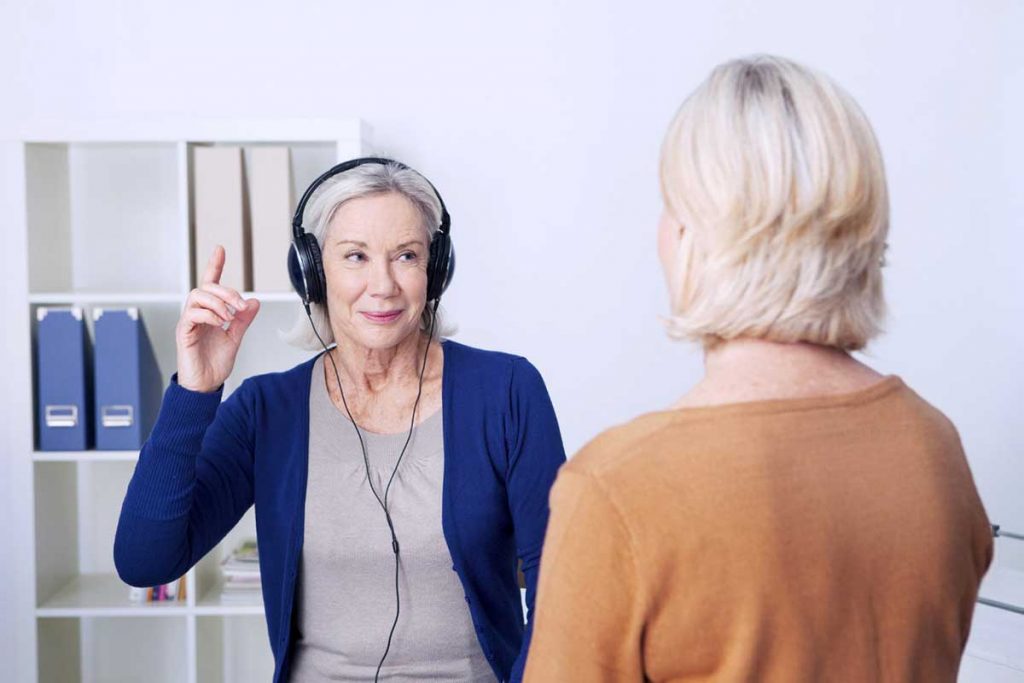
One of the most important steps to improve your hearing is to schedule a diagnostic hearing evaluation.
By understanding each step, you can approach your hearing test with confidence, knowing you’re taking proactive steps toward better hearing and overall well-being. Keep reading if you want to find out more.
Visiting an Audiology Clinic
The first step in addressing your hearing concerns is scheduling an appointment with an audiology clinic. Audiologists are highly trained professionals specialized in diagnosing and treating hearing related issues. They will provide guidance on the best course of action for treatment.
What is a Diagnostic Hearing Evaluation
A diagnostic hearing evaluation is a comprehensive hearing test that evaluates your hearing abilities and is conducted by a qualified audiologist. This assessment aims to determine the extent and nature of an individual’s hearing loss and helps the audiologist identify any underlying issues.
The results from these tests are crucial in developing a personalized treatment plan. This may involve hearing solutions like hearing aids, cochlear implants, or other assistive devices.
Keep in mind that there are various kinds of hearing loss that people suffer from.
What is Included in a Diagnostic Hearing Evaluation
Several types of hearing tests may be conducted during a diagnostic hearing evaluation. These tests will help your audiologist provide the proper hearing solutions. Are you considering a comprehensive hearing test but unsure of what to expect? We’re here to guide you through the step-by-step process:
1. Case History: Getting to Know You
The first step in a comprehensive hearing test is a detailed case history. The audiologist will ask you questions about your medical history, symptoms, and factors that might affect your hearing, such as exposure to loud noise. This information will help provide the audiologist with insight into potential causes of your hearing loss.and tailor the testing process accordingly.
2. Otoscopy: A Visual Examination
Next, the audiologist will perform an otoscopy, a visual examination of your outer ear and ear canal using a handheld device called an otoscope. This simple and painless procedure allows the audiologist to check for any visible issues like earwax buildup, infections, or abnormalities that could impact your hearing.
3. Pure-Tone Audiometry: Hearing Threshold Testing
Now comes the pure-tone audiometry. Wearing headphones, you’ll listen to tones of different frequencies and volumes. You’ll indicate when you hear each tone, enabling the audiologist to determine your hearing threshold at various frequencies. This test provides crucial information about the softest sounds you can detect across different pitches.
4. Tympanometry: Understanding Middle Ear Function
Tympanometry measures the movement of your eardrum and the function of the middle ear. A gentle probe is placed in your ear, and changes in air pressure are applied. This test helps the audiologist evaluate the health and mobility of the eardrum and middle ear structures.
5. Speech Audiometry: Assessing Speech Understanding
Speech audiometry evaluates your ability to understand speech. You may be asked to repeat words or sentences presented at varying volumes and in different listening conditions. This includes testing for speech recognition thresholds (SRT), which determines the lowest volume at which you can understand speech accurately.
6. Speech in Noise Testing: Real-World Listening Situations
In addition to SRT, the audiologist may conduct speech in noise testing. This involves listening to speech with background noise, mimicking real-world listening situations. It helps assess your ability to understand speech in challenging acoustic environments, such as crowded restaurants or busy social gatherings.
7. Tinnitus Testing: Evaluating Tinnitus Symptoms
If you’re experiencing tinnitus (ringing or buzzing sounds in your ears), the audiologist may conduct specific tests to evaluate your tinnitus symptoms. These tests help assess the characteristics and impact of your tinnitus, providing valuable information for treatment and management options.
8. Results and Recommendations: Personalized Care
After completing the tests, the audiologist will discuss the results with you. They will explain any hearing loss, tinnitus, or other issues identified and provide recommendations for further referrals, treatment options, or the use of hearing aids if necessary. The audiologist’s expertise will guide you in making informed decisions about your hearing health.
Diagnostic Hearing Evaluation Preparation
Before your appointment, avoid loud noises to prevent temporary hearing loss.
Come prepared with a list of any medications you’re taking and questions about your hearing so you can discuss them with the audiologist during your visit.
Schedule a Diagnostic Hearing Evaluation
If you experience any symptoms of hearing loss, a diagnostic hearing evaluation will offer insights into your hearing health.
Are you ready to schedule a diagnostic hearing evaluation in Edmonton? If so, the audiologists at Wild Rose Audiology Clinic have the expertise to help you.
Wild Rose Audiology Clinic has been a trusted provider of audiology services since 1994. We have a team of audiologists with extensive experience and training. Don’t hesitate to reach out to us to get started today!
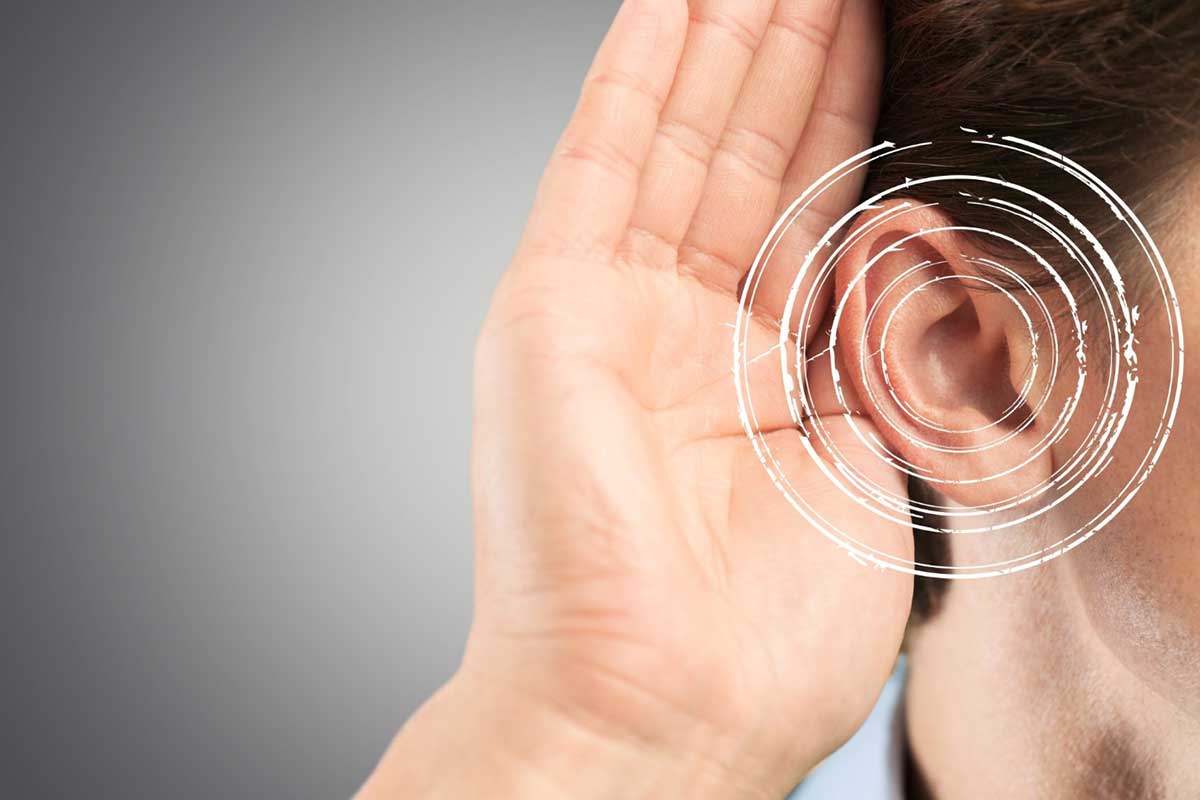
Losing Your Sense of Hearing Doesn’t Only Happen in Old Age
Did you know that hearing loss affects more than 3 million people in Canada? Contrary to common belief, hearing loss is not solely a consequence of aging.
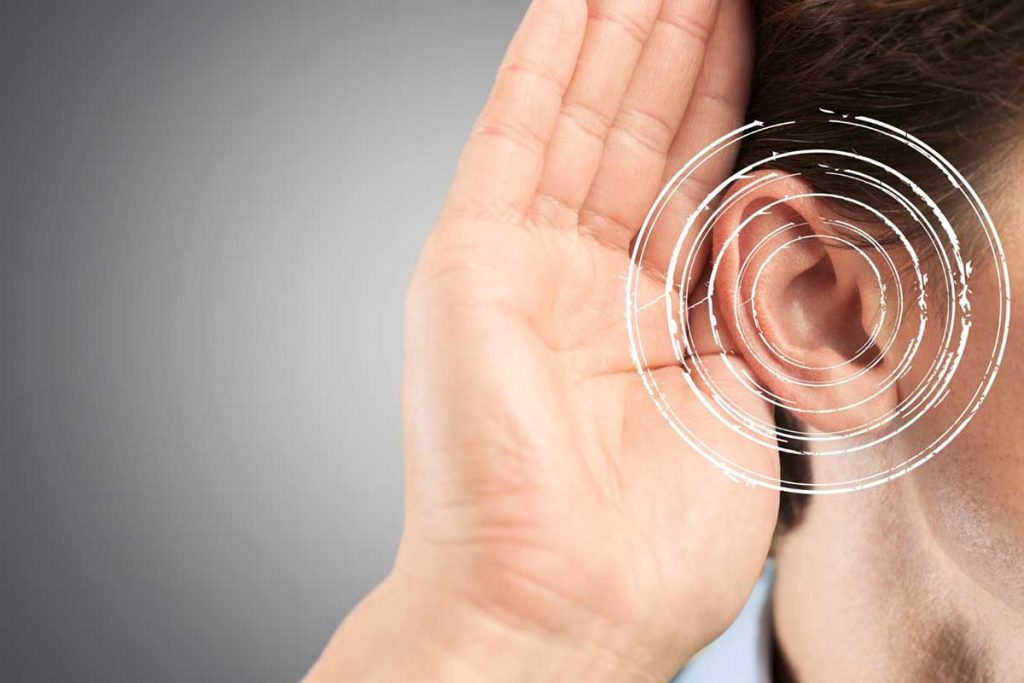
In this blog, we’ll explore the various causes, subtle symptoms, and treatments of hearing loss, shedding light on this prevalent condition.
What Are the Symptoms of Hearing Loss?
Recognizing the signs of hearing loss is essential.
Imagine struggling to grasp conversations amidst bustling environments or resorting to cranking up the volume on your electronic devices. Picture an unwelcome symphony of ringing or buzzing in the ears disrupting your daily rhythm. Frustration lingering as conversations slip through your grasp. These intriguing signs may indicate the presence of hearing loss.
What Are the Causes of Hearing Loss?
While aging plays a part, other causes deserve attention.
Prolonged exposure to loud noises, such as loud music, construction sites, or machinery can damage the delicate structures of the ear and cause hearing loss.
Genetic conditions or hereditary factors can contribute to hearing loss. Viral and bacterial infections or head injuries can damage the ear structure resulting in hearing loss.
Certain medications, known as ototoxic drugs, can have side effects and damage the auditory system.
What Are the Treatments for Hearing Loss?
The appropriate treatment for hearing loss depends on its type and severity. Hearing aids are a common solution, amplifying sound and improving speech comprehension. For more severe cases, cochlear implants that directly transmit electrical signals to the auditory nerve are recommended.
Assistive listening devices such as FM systems, remote microphones or TV devices are used. Some types of hearing loss may require medical or surgical treatment.
Communication strategies such as lipreading or sign language can help individuals with hearing loss better understand conversations and interact effectively.
When to Seek Out Professional Help?
If you experience symptoms of hearing loss, it’s recommended to consult an audiologist.
Audiologists are highly trained professionals specialized in diagnosing and treating hearing related issues. Don’t wait in silence—reach out to these devoted professionals. They will provide guidance on the best course of action for treatment.
Regular hearing tests are recommended for early detection and prevention of further hearing loss.
Hearing Loss Can Affect Anyone
It’s essential to dispel the misconception that hearing loss only affects the elderly. Anyone can be susceptible. Regular testing empowers individuals to take timely action and preserve their hearing for longer.
How Wild Rose Audiology Clinic Can Help
For nearly three decades, Wild Rose Audiology Clinic has been a trusted provider of comprehensive audiology services in Edmonton and the surrounding area.
Our team of certified audiologists is dedicated to delivering exceptional care through a range of specialized services, including meticulous hearing tests for children and adults, tailored treatments incorporating advanced hearing aids and assistive listening devices.
Take a proactive step towards addressing your hearing concerns by booking an appointment with one of our audiologists. Your journey to optimal hearing begins with Wild Rose Audiology Clinic.
Losing Your Sense of Hearing Is Often Preventable
Knowing the signs and causes of hearing loss can be crucial for seeking the necessary treatments and preventing any long-term damage to your hearing.
By keeping the above information in mind, you’ll be sure to take proactive steps towards resolving any hearing concerns as soon as they arise.
Looking for more information about our services and how we can assist you? We invite you to reach out to us at Wild Rose Audiology Clinic today to see what we can do.

How often should your hearing be tested?
Approximately 40% of adults in Canada aged 20 to 79 have experienced hearing loss; however, many are unaware. Hearing loss can be due to genetics, aging, prolonged damage due to noise exposure, illness, and other reasons.

Scheduling a hearing assessment with a local audiologist can help diagnose hearing problems and provide knowledge on the best types of management options that are available.
How often should your hearing be tested? We’re glad you asked.
Keep reading to learn more about the benefits of hearing tests and how frequently you should get them done.
How Often Should Your Hearing Be Tested?
Experts suggest you should get your hearing checked every 2 years if you’re 60 and older. Hearing tests should be conducted once a year if hearing loss has been detected.
Choose a registered audiologist that can address your hearing concerns. Find an audiologist in your Edmonton area that is certified.
What Happens During a Hearing Test?
The hearing test will generally take place in a soundproof booth. You will wear earphones and repeat words presented at different volumes. You will also be required to listen to very soft beeping sounds and indicate if you could hear them in both ears. The audiologist will track your results to see if your hearing sensitivity falls within normal range, or if you struggle to hear certain sounds.
The results will be displayed on an audiogram, and this will allow your audiologist to describe the degree of hearing loss and make appropriate recommendations.
How to understand your test results?
Knowing about different types of hearing loss may help you better understand the results of your hearing assessment.
There are three types of hearing loss: Sensorineural hearing loss, Conductive hearing loss and Mixed hearing loss.
Sensorineural Hearing Loss
Sensorineural hearing loss is caused by problems with the inner ear (cochlea) and/or the auditory nerve. It is typically known as ‘permanent’ hearing loss. There is no medical or surgical solution for sensorineural hearing loss. Hearing aids or another form of assistive listening devices are usually recommended.
Common causes of sensorineural hearing loss include genetics, head injury, bacterial meningitis, medications (e.g., cancer treatments), pregnancy/birth problems, aging and noise exposure, etc.
Conductive Hearing Loss
Conductive hearing loss is caused by problems with the outer- and/or middle-ear. It may be permanent or temporary, and may fluctuate in severity. Conductive hearing loss may also be medically/surgically manageable. Management of conductive hearing loss may include referral to an Ear Nose and Throat (ENT) specialist, hearing aids or other forms of assistive listening devices.
Common causes of conductive hearing loss include (but are not limited to) wax or foreign objects in the ear canal, a hole/perforation in the eardrum, infection of the outer ear, infection of the middle-ear, broken middle-ear bones, narrow or closed ear canal from birth, etc.
Mixed hearing loss
Mixed hearing loss has mixture of both sensorineural and conductive components to hearing loss. It results from damage to both the outer/middle ear as well as the inner ear/nerve.
Take Care of Your Hearing
Now that you understand more about your hearing, consider scheduling a hearing assessment.
If you’re over 60 years old it is recommended to have your hearing assessed once every 2 years. For individuals with diagnosed hearing loss a hearing assessment is typically recommended annually.
Hearing loss is not just an age-related problem. If you feel you are having hearing difficulties, we encourage you to book a hearing assessment. This will allow you to proactively manage your hearing health, which could include scheduling regular wax removal, setting up physician referrals, or benefiting from trial with a hearing aid or amplification device.
If you have been looking for a certified audiologist in Edmonton, Wild Rose Audiology can help. Take the time to contact us online today or give us a call at (780)447-3881 to book an appointment.
What’s new and exciting in the world of hearing aid technology
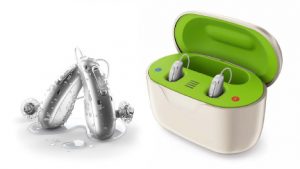
Audéo P-Life
The world’s first waterproof and rechargeable hearing aids
- World’s first waterproof rechargeable hearing aid (up to 50cm of water)
- Made-for-all connectivity
- Audéo P-Life supports a healthy lifestyle and gives your clients the confidence to wear their hearing aids during all their activities, with no fear of water damage.
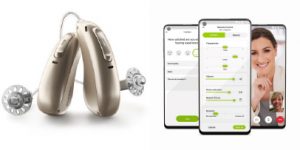
Audéo Fit™
The world’s first hearing aid with built in heart rate tracking – to promote physical well-being
- Audéo Fit provides clients with the ability to track heart rate, steps and activity levels (in order to access health data, it is necessary to create an account within myPhonak app).
- Delivers unrivaled sound quality and universal connectivity.
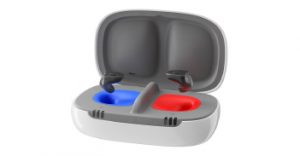
Custom Rechargeable Hearing Aids
First custom hearing aids with lithium-ion contactless charging
- Charge them while resting or sleeping and keep going throughout the day with up to 20 hours of use on a single charge.
- Insio Charge&Go AX also offer state-of-the-art Bluetooth connectivity for Android and iOS (Apple) devices. Wearers can easily stream their phone calls, music and TV audio via their custom hearing aids.
- They can also connect to the Signia app (remote control app).
- 6 color options for shell and faceplate
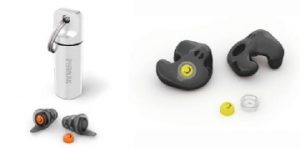
Serenity Choice Hearing Protection
New hearing protection available to suit all activities
- Universal hearing protection – music, sports, sleep, hunting/shooting, work, comfort
- Custom hearing protection options
- New Phonak Serenity Choice™ provides best in class attenuation and sound quality

Wild Rose Audiology Clinic is now an approved Lyric hearing aid provider.
Our audiologists are trained to determine your candidacy for this 100% invisible device that can be worn 24/7!
Please contact us for more information.

Hearing aid donations
We are accepting hearing aid donations as our audiology team is getting ready to send our annual batch of donated hearing aids to the children and adults in Ecuador. Photo care of: http://www.cvids.net/gallery/




